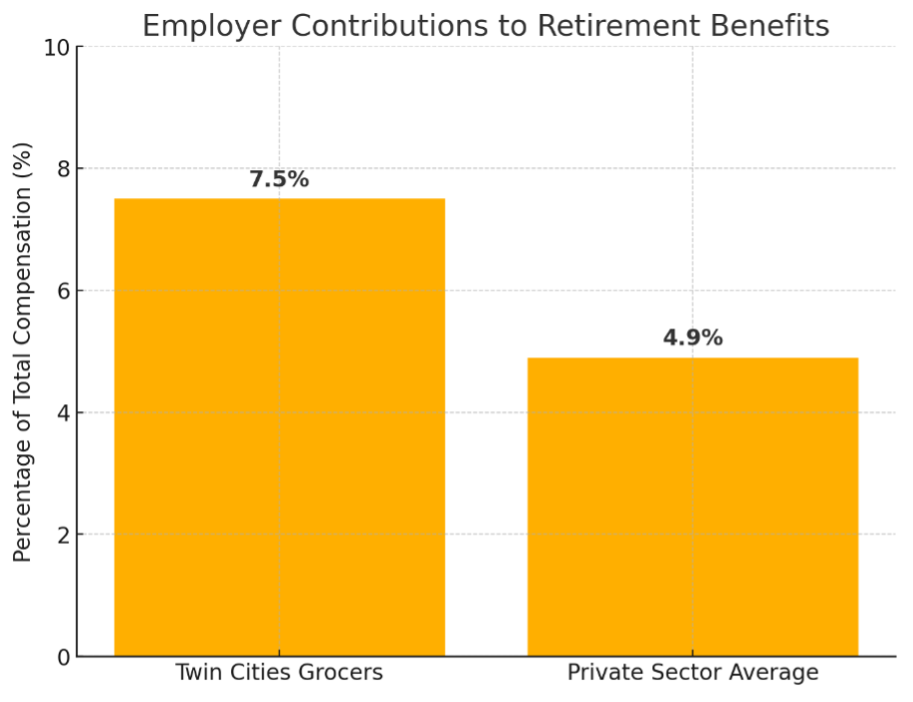Certainty Matters in Healthcare
Grocers are committed to providing a dependable, affordable, and competitive healthcare plan—one employees can count on when they need it most.
Until recently, outdated plan rules caused eligible employees to lose coverage for a week or more when they didn’t meet required work hours. For years, Grocers pushed for a solution, but progress was delayed. Only after taking decisive action in 2023 did we secure necessary improvements, ensuring continuous coverage starting January 1, 2025. Now, the Union has proposed to reintroduce uncertainty, making eligibility depend on hours worked every 12 weeks.
Grocers have kept healthcare affordable, maintaining low deductibles and out-of-pocket costs for full-time and part-time employees while absorbing rising expenses. Now, the Union proposes expanding comprehensive coverage for more part-time employees—increasing costs by up to 60%. Additionally, the Union demands Grocers continue paying unnecessarily high premiums to overfund plan reserves, which already exceed plan professional recommendations.
Certainty matters. Grocers have invested in Healthcare to provide long-term stability and lower employee expenses by maintaining premium costs, deductibles and other expenses. We remain committed to stable, reliable, and affordable healthcare for employees and their families.
Q: Are the Union claims true that Grocers simply want to spend down healthcare reserves so they can save money?
A: No. For many years, Grocers have made the necessary investments to ensure healthcare benefits remain funded with healthy reserves. In the current contract negotiations, Grocers proposals are based on guidance from independent healthcare plan professionals, jointly hired by both the Union and Grocers to provide fiduciary guidance. These experts have advised that current reserves exceed necessary levels.
Grocers are not proposing, nor would it be permitted, to remove funds currently invested in the plan. Instead, they have requested more analysis from plan professionals to determine what the new premium rates must be to maintain or enhance current benefits while preserving necessary reserves. Grocers invited the Union to participate in this request, however, the Union choose not to participate. Grocers requested new modeling for maintaining reserves at 15% and 30% above what plan professionals had deemed adequate.
Notably, during the 2023 contract negotiations, healthcare reserves were similar to current levels. However, the Union proposed diverting nearly $7.2 million in healthcare contributions over two years to fund their wage and retirement proposals—suggesting they believe plan reserves exceed what is necessary. This diversion was implemented in the 2023 union contract.
Q: Why are the Grocers proposing a percentage-based cost share model for premiums with its employees? Won’t this shift costs to your employees as the Union claims?
A: Grocers have covered 90% or more of premium costs in several of the recent negotiated contracts.
Grocers have proposed exploring a percentage-based cost-sharing model but have not been able to introduce specific details. We first needed the additional analysis from healthcare plan professionals, which we now have, and we are equipped to resume negotiations on this topic. The Union’s claim that this proposal would shift costs to employees is speculative and not based on facts.
As with all proposals, this will be guided by the Union’s stated priorities in bargaining and must be balanced with other factors—including wages, retirement, healthcare improvements, and other contract modifications—that also impact overall costs.
Our Commitment to Retirement
Your Twin Cities Grocers are proud to provide industry-leading retirement benefits, investing roughly 7.5% or more of total eligible wages into eligible employees’ retirement accounts last year. By comparison, according to the U.S. Department of Labor – Bureau of Labor Statistics (December 2024 New Release), private sector employers contributed an average of only 4.9% of total wages toward retirement benefits. This means our investment today is already substantially more than the national private-sector average.
Exhibit 1

Source: U.S. Department of Labor – Bureau of Labor Statistics (December 2024 News Release)
Grocers have long upheld their commitment to funding employee retirement benefits. Every grocer has employees—both active and retired—who have earned and rely on benefits from the UFCW 663 Minneapolis Retail Meat Cutters and Food Handlers Pension Plan, a plan that has faced significant financial challenges. To ensure long-term stability, grocers have transitioned nearly all employees to sustainable and secure retirement plans, such as a 401(k) plan or Variable Annuity Pension Plan. In addition to funding these new retirement accounts, grocers have never failed to meet their financial obligations under the former pension plan.
Despite these facts, the Union asserts that grocers must contribute more. The reality is that Twin Cities Grocers already provide retirement benefits that significantly exceed private-sector norms.
We remain deeply committed to ensuring our employees can retire with financial security, dignity, and peace of mind. Our strong investment in retirement benefits reflects our appreciation for our employees and our ongoing dedication to their long-term well-being.
A Three-Fold Commitment: Employees, Customers, Community
We value our employees and have a demonstrated track record of positive relations as evidenced by the industry-leading employee tenures and career advancement. We strive for fair and equitable contracts and take pride in offering competitive pay, comprehensive benefits, and opportunities for growth.
Grocers have consistently provided increases to wages, while maintaining a sustainable and resilient business our customers have come to rely on in the communities we serve. The Union wage proposals jeopardize that longtime three-fold commitment.
We believe it is essential – even expected by the communities we serve – to arrive at contract terms that advance our employee’s compensation in a fair and equitable way, and allow us to operate a sustainable, resilient business well into the future.
After agreeing to compensation increases the union called “historic gains in wages and pay equity” and “significant raises for part-time and full-time positions” just two years ago in 2023, Twin Cities Grocers want to offer compensation increases again; increases that will still allow us to remain competitive and offer customers fair prices. With a full understanding the current wages and progressions have been negotiated over decades of ratified contracts by union leadership, employees and the employers.
| Classification | Knowlan’s | Cub | L&B | Kowalski’s | Haug | Radermacher | Jerry’s |
|---|---|---|---|---|---|---|---|
| Courtesy | 10.7% | N/A | 9.71% | 10.12% | N/A | N/A | N/A |
| Part Time | 10.8% | 8.88% | 10% | 9.33% to 10.12% | 10.21% | 10.21% | 9.21% |
| Retail Spec. | N/A | N/A | N/A | 12.35% | 13.16% | 13.16% | 13.16% |
| Full Time Food Handler | N/A | 8.9% | 9.64% | 9.73% | 10.23% | 10.23% | 10.23% |
| Pharmacy | N/A | 8.9% | N/A | N/A | 10.23% | 10.23% | 10.23% |
| Classified Assistant | 10.98% | 9% | 10.3% | 10.41% | 10.98% | 10.98% | 10.98% |
| Dept. Head | 9.09% | 9.09% | 9.53% | 9.14% | 9.89% | 9.89% | 9.89% |
| Assistant Manager | 9.09% | 9.09% | 9.53% | 9.14% | 9.89% | 9.89% | 9.89% |
| Service & Meat Helper | N/A | 9.37% | 9.64% | N/A | 11.3% | 11.3% | 11.3% |
| Journeyman | 9.90% | 9.06% | 9.23% | 9.39% | 9.86% | 9.86% | 9.86% |
| Head Meat Cutter/Meat Manager | 9.5% | 8.78% | 9.36% | 8.84% | 9.54% | 9.54% | 9.54% |
| Part Time – All | 10.70% to 10.80% | 8.88% | 9.70% to 10.00% | 9.33% to 10.12% | 10.21% | 10.21% | 9.21% |
| Full Time – All | 9.50% to 10.98% | 8.78% to 9.37% | 9.23% to 10.30% | 8.84% to 12.35% | 9.54% to 13.16% | 9.54% to 13.16% | 9.54% to 13.16% |
Q: Are Grocers offering employees wage increases in this round of bargaining?
A: Yes, the Grocers proposed a range of approximately 2.96% – 4.39% depending on the specific store and position. Wages sometimes vary across grocers due to higher legacy pension contributions. These wage proposals compound to total increases of 8.78% – 13.16% over the life of the contract. This is in addition to an exceptional Gold Standard healthcare program with low employee contributions and the remainder funded by the employer and maintaining strong retirement plans.
Q: What kind of increases did employees receive in their most recent contract before this one?
A: Wage increases varied among grocers, and the Union called them “historic” and “significant“ when that contract was ratified by the UFCW 663 members. In the first year of the contract ratified in 2023, Full Time employees at top of scale received $1.30 per hour or more and Part Time employees at the top of scale received .95¢ per hour or more. In the second year of the contract ratified in 2023, Full Time employees at the top of scale received $1.00 or more per hour and Part Time employees at the top of scale received $1.00 or more per hour.
Q: Why won’t you make any pay increases in an agreement retroactive?
A: To support timely negotiations, we offered a maximum of one week of retroactive pay. Under these proposals, the effective date of the retro pay depended on the date the contract was ratified. This means our team members would have received negotiated raises promptly if ratification occurred within a week of the current contract’s expiration or earlier if ratified before the expiration date. But, as the union failed to offer more bargaining dates in January and February, ratification did not occur before the contract expired or within the week beyond the expiration date. Raises proposed and ratified by the membership will be paid retroactively for only one week before the actual ratification date.
Q: Why don’t wage increases always match inflation?
A: Inflation is a temporary average that changes often. Tying a long-term series of wage increases to a fluid and changing index such as inflation is irresponsible and bad governance. We strive to provide fair and equitable increases and take pride in offering competitive pay, comprehensive benefits, and opportunities for growth.
General Questions Regarding Negotiations
As Twin Cities grocers, we have a responsibility to our customers and our communities. But our commitment has always started with our employees. We value our employees and have a demonstrated track record of good-faith negotiations. We strive for fair and equitable contracts and are committed to doing so in a cordial and professional way.
We believe this is essential – even expected by the communities we serve – to arrive at contract terms that not only advance our employees’ interests, but allow us to continue to operate a sustainable, resilient business for our customers well into the future.
Negotiations are designed to apportion resources in a way that best serves the interest of employees, employers and customers. This requires give and take and Union leadership is asked to prioritize the needs of its members and determine where to request those resources. This give and take also applies to policies that improve the health, safety and job satisfaction of employees, while allowing local Twin Cities grocers to continue to operate a competitive business in the future for its customers and communities.
Q: Are Minneapolis Grocers forcing employees to transfer to distant stores causing undue hardship with no recourse?
A: Most grocers operate multiple stores in the Twin Cities metro area to better serve customers by allowing the stores to support each other. Transfers also offer employees a faster path to promotion and the corresponding increases in pay and benefits. The same is true for transferring departments (which is also why the grocers find cross-training so important). All employers that heard concerns about transfer language have made adjustments in their proposals.
Q: Why are employees asked to cross-train or work outside of their department?
A: Cross-training affords employees an opportunity to learn about the business and prepares them for career advancement opportunities. And even if an employee is only looking at the short-term benefits, cross-training gives them greater opportunities to be scheduled or pick up more hours as compared to their colleagues who are limited in what they are trained to do.
Q: Is it in the employees’ best interest to fill employee position vacancies with the most senior internal applicant whenever possible?
A: No. It is crucial to employee and customer satisfaction that the most qualified and capable person is selected for each and every role. This should matter to employees because these processes determine who will manage, support and work alongside them. Seniority does not consider qualifications and ability to best serve customers and fellow employees.
Q: Are grocers resorting to multi-employer bargaining to force union employees to accept unfair proposals?
A: No. Local grocers have not consented to multi-employer bargaining; instead, they are coordinating their bargaining for their respective collective bargaining agreements with Local 663, which remain distinct from each other. If agreed to, any proposals would simply form part of each of these separate grocer agreements. This serves to speed the negotiating process and hopefully result in a contract acceptable to both sides sooner. As of April 17, 2025 there have only been 12 bargaining days. This is less bargaining days between the union, bargaining committee and employers than there were in 2023 when each employer met individually.
Q: Didn’t you just have contract negotiations? Why do you need to have them again so soon?
A: Twin Cities Grocers and UFCW Local 663 work on contracts of varying lengths, depending on the specific Twin Cities Grocer. Twin Cities Grocers are advocating for a four year contract with all UFCW Local 663 members to increase stability and employee certainty. Through the negotiation process, the employers have offered to reduce their proposal for the length of a new contract when ratified to three years.


